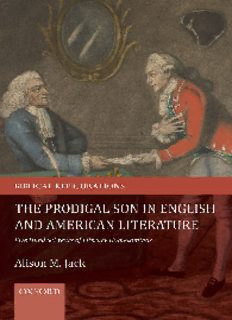Table Of ContentOUPCORRECTEDPROOF–FINAL,22/9/2018,SPi
fi
Biblical Re gurations
The Prodigal Son in English
and American Literature
OUPCORRECTEDPROOF–FINAL,22/9/2018,SPi
BIBLICAL REFIGURATIONS
GeneralEditors:JamesCrossleyandFrancescaStavrakopoulou
This innovative series offers new perspectives on the textual, cultural, and
interpretativecontextsofparticularbiblicalcharacters,invitingreaderstotake
a fresh look at the methodologies of Biblical Studies. Individual volumes
employdifferentcriticalmethodsincludingsocial-scientificcriticism,critical
theory, historical criticism, reception history, postcolonialism, and gender
studies, while subjects include both prominent and lesser-known figures
fromtheHebrewBibleandtheNewTestament.
PublishedTitlesInclude:
JeremySchipper DisabilityandIsaiah’sSufferingServant
KeithBodner Jeroboam’sRoyalDrama
MarkLeuchter SamuelandtheShapingofTradition
LouiseJ.Lawrence SenseandStigmaintheGospels:Depictionsof
Sensory-DisabledCharacters
WilliamJohnLyons JosephofArimathea:AStudyinReceptionHistory
JamesCrossley JesusandtheChaosofHistory:RedirectingtheLife
oftheHistoricalJesus
NyashaJunior ReimaginingHagar:BlacknessandBible
OUPCORRECTEDPROOF–FINAL,22/9/2018,SPi
fi
Biblical Re gurations
GENERALEDITORS:JAMESCROSSLEYANDFRANCESCASTAVRAKOPOULOU
The Prodigal Son
in English and
American Literature
Five Hundred Years
of Literary Homecomings
ALISON M. JACK
1
OUPCORRECTEDPROOF–FINAL,22/9/2018,SPi
3
GreatClarendonStreet,Oxford,OXDP,
UnitedKingdom
OxfordUniversityPressisadepartmentoftheUniversityofOxford.
ItfurtherstheUniversity’sobjectiveofexcellenceinresearch,scholarship,
andeducationbypublishingworldwide.Oxfordisaregisteredtrademarkof
OxfordUniversityPressintheUKandincertainothercountries
©AlisonM.Jack
Themoralrightsoftheauthorhavebeenasserted
FirstEditionpublishedin
Impression:
Allrightsreserved.Nopartofthispublicationmaybereproduced,storedin
aretrievalsystem,ortransmitted,inanyformorbyanymeans,withoutthe
priorpermissioninwritingofOxfordUniversityPress,orasexpresslypermitted
bylaw,bylicenceorundertermsagreedwiththeappropriatereprographics
rightsorganization.Enquiriesconcerningreproductionoutsidethescopeofthe
aboveshouldbesenttotheRightsDepartment,OxfordUniversityPress,atthe
addressabove
Youmustnotcirculatethisworkinanyotherform
andyoumustimposethissameconditiononanyacquirer
PublishedintheUnitedStatesofAmericabyOxfordUniversityPress
MadisonAvenue,NewYork,NY,UnitedStatesofAmerica
BritishLibraryCataloguinginPublicationData
Dataavailable
LibraryofCongressControlNumber:
ISBN––––
Printedandboundby
CPIGroup(UK)Ltd,Croydon,CRYY
LinkstothirdpartywebsitesareprovidedbyOxfordingoodfaithand
forinformationonly.Oxforddisclaimsanyresponsibilityforthematerials
containedinanythirdpartywebsitereferencedinthiswork.
OUPCORRECTEDPROOF–FINAL,22/9/2018,SPi
Acknowledgements
This book has had a long gestation, and I have been encouraged
along the wayby many people. Colleagues at the School of Divinity,
UniversityofEdinburgh, havebeensupportiveandinterested,fullof
suggestions and ideas. Church groups who have heard me talk about
theparablesandtheProdigalSoninparticularhavebeenkeentoshare
theirinsightswithme,andIhaveappreciatedthisverymuch.
The bookwasfinishedduringaperiodofresearch leave,andIam
gratefultotheUniversityofEdinburghfortheopportunitytobefree
ofotherresponsibilitiesandtofocusondrawingthematerialtogether.
TwoshortperiodsofstudyatWestminsterCollege,Cambridge,helped
toconsolidateideasandfillinresearchgaps,andwereofgreatbenefitin
thefinalyearofwriting.
The editorialteam at Oxford UniversityPresshas beensupportive
andunderstandingthroughouttheprocess,andIwouldliketothank
themfortheguidancetheyhavegivenme.
Thetitleofthebookwasthesubjectofsomediscussion.‘Literature
in English’ seemed to raise unmet expectations, and so ‘English and
AmericanLiterature’wasagreed.Thisshouldnotbetakentodown-
playthetextsfromthefieldofScottishliteraturewhicharesoimport-
ant throughout the book, and I hope my friends and colleagues
workinginthatfieldwillunderstandthebalancingactthathadtobe
struckbetweenfulldescriptionandaworkabletitle.
Mychildren,IainandFiona,havebeenpatientanduncomplaining
whenIhavefelttheneedtopointoutaProdigalSonreferenceinevery
film,televisionprogramme,orbookwehaveexperiencedtogether.As
always,Iowethemmythanksfortheirunfailingresilienceandsense
of fun. Drew Brown was an encouraging and supportive presence as
thebookneareditscompletion.
Finally,IdedicatethisbooktoIanCampbell,EmeritusProfessorof
ScottishandVictorianLiteratureattheUniversityofEdinburgh,who
hasbeenateacher,mentor, andfriend forthirtyyears now,and who
continuestobeasupportiveadvocateofmywork.
OUPCORRECTEDPROOF–FINAL,22/9/2018,SPi
vi Acknowledgements
Excerptsfrom‘CrusoeinEngland’,‘Over,Illustrationsanda
Complete Concordance’, ‘The Prodigal’, and ‘Questions of Travel’
from Poems by Elizabeth Bishop. Copyright © by The Alice
H. Methfessel Trust. Publisher’s Note and compilation copyright
© by Farrar, Straus and Giroux. Reprinted by permission of
Farrar, Straus and Giroux. Also published in The Complete Poems
– volume. In the UK, these poems are found in Poems by
Elizabeth Bishop published by Chatto and Windus. Reproduced by
permissionoftheRandomHouseGroupLtd.©.
Permission to quote from the poetry of Iain Crichton Smith has
beengrantedbyCarcanetPress(<http://www.carcanet.co.uk>),andis
acknowledged with gratitude. The lines quoted are all from Iain
Crichton Smith, New Collected Poems, edited and introduced by
MattMcGuire(Manchester:CarcanetPressLtd,).
‘Never Go Back’ by Felix Dennis, taken from A Glass Half Full
(Hutchinson, ), © Felix Dennis, is reproduced by kind permis-
sionoftheFelixDennisLiteraryEstate.
A short section of Chapter is adapted from my article ‘Henry
James’s“TheJollyCorner”:RevisitingtheParableoftheProdigalSon
(Luke .–)’ in Journal of the Bible and its Reception, vol. .
():pp.–,andisusedwithpermission.
OUPCORRECTEDPROOF–FINAL,22/9/2018,SPi
Contents
. ReadingtheProdigalSon
. TheProdigalSoninElizabethanLiterature
. TheProdigalSonandShakespeare
. FemaleVictorianNovelistsandtheProdigalSon
. TheAmericanShortStoryandtheProdigalSon
. ProdigalMinistersinFiction
. TheProdigalSoninPoetry:ElizabethBishop
andIainCrichtonSmith
. Conclusion
Bibliography
Index
OUPCORRECTEDPROOF–FINAL,22/9/2018,SPi
OUPCORRECTEDPROOF–FINAL,22/9/2018,SPi
1
Reading the Prodigal Son
‘Prodigal’isanadjectivewithachequeredpast.ItsLatinrootisprodigus,
whichdenotesalavishnesswhichismorallyneutral.IngeneralEnglish
usage,stronglynegativeconnotationsattenditssenseofwastefulsquan-
dering. However, more recently, ‘prodigal’ has cut loose from such
negativity to take on a much more positive understanding which
includes waywardness, perhaps, but more strongly still, a willingness
toseek out adventure, even self-fulfilment,and a certain generosity of
spirit.Today,thewordismostoftenusedinthecontextofJesus’parable
aboutafatherandtwosons(Luke:–),theyoungerofwhomis
givenstarbillinginthetitle:itis‘TheParableoftheProdigalSon’ in
common English usage.1 This son is often simply referred to as ‘the
Prodigal’, and a negative judgement is certainly implied by Jerome’s
reference in the fourth century CE to the parable as a story about the
contrastbetween‘theprudentandprodigalsons’.2WhenIhaveintro-
duced the parable to students in my Bible and Literature classes,
1 Themostsignificantearlyassociationof‘prodigal’withthischaracterinan
EnglishtranslationoftheBibleistobefoundintheGenevaBible,whichwasfirst
publishedwithboththeOldandNewTestamentsin.Heretheparableis
introducedinthetextastheparable‘oftheProdigalSonne’,andthepageheading
repeats this, although the word is not found in the story itself. The same page
headingwasusedintheKingJamesVersionoftheBiblepublishedin,sealing
the ongoing connection between the parable and the prodigality of the younger
son.Thehistoryoftheword’sassociationwiththeparableischartedindetailin
EzraHorbury,‘AristotelianEthicsandLuke:–inEarlyModernEngland’,
JournalofReligiousHistory.(June):pp.–.
2 Jerome, Lives of Illustrious Men, ch. , quoted in Amy-Jill Levine, Short
Stories by Jesus: The Enigmatic Parables of a Controversial Rabbi (New York:
HarperCollins,),p..
Description:The Parable of the Prodigal Son is one of the best-known stories in the Bible. It has captured the imagination of commentators, preachers and writers. Alison M. Jack explores the reconfiguring of the character of the Prodigal Son and his family in literature in English. She considers diverse literar

